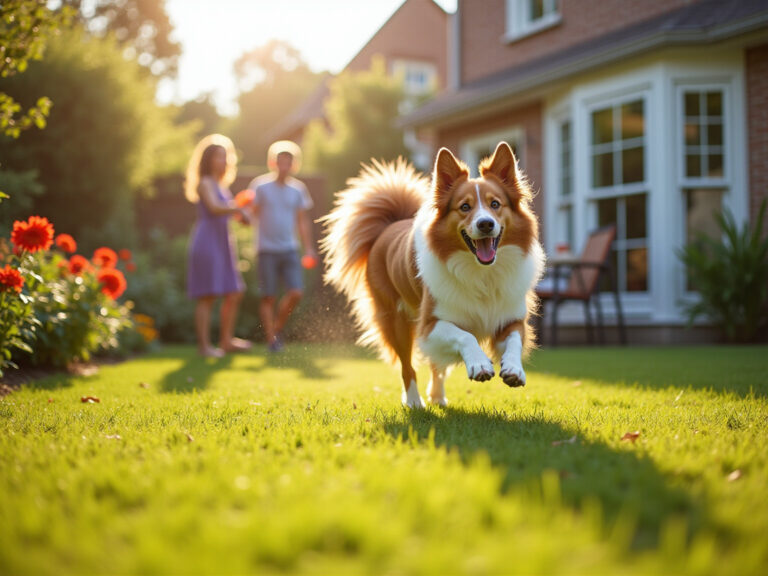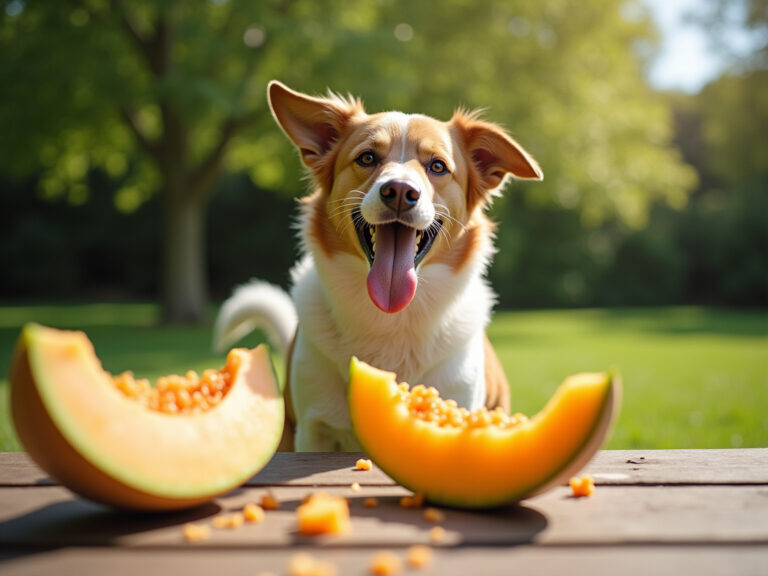Can Dogs Eat Cashews? Safe Introduction and Risks Explained
Overview
As a loving pet owner, you may wonder if your furry family members can enjoy a tasty treat like cashews. The good news is that dogs can eat cashews in moderation! These nuts offer nutritional benefits, including healthy fats and essential minerals that can contribute to your dog’s well-being. However, it’s important to approach this new food with care, as there are potential health risks to consider.
To ensure a safe introduction of cashews into your dog’s diet, start slowly. Monitor your pet for any adverse reactions, and if you have concerns, don’t hesitate to consult with your veterinarian—especially if your dog has specific health issues. By taking these precautions, you can help ensure that your beloved companion enjoys this treat safely and happily.
At Adventure Den, we understand the importance of nurturing environments for your pets. We encourage you to explore new treats like cashews, but always with a watchful eye. Remember, your dog’s safety and well-being are our top priorities. Together, we can make informed choices that keep your furry family members healthy and content.
Introduction
In the quest for the perfect treat for your furry family members, pet owners often find themselves exploring various snack options. Among these, cashews shine with their rich nutritional profile, offering healthy fats and essential minerals that can truly benefit dogs.
However, introducing this nut into your dog’s diet comes with its own set of challenges and risks. With potential health concerns ranging from obesity to allergies, understanding how to safely incorporate cashews is vital for your pet’s well-being.
This article delves into the nutritional value of cashews for dogs, highlights the associated risks, and provides best practices for introducing this treat, ensuring that your beloved companions can enjoy them safely and healthily.
Understand the Nutritional Value of Cashews for Dogs
When introduced in moderation, cashews can be a delightful addition to your furry family members’ diet, but it’s important to consider, can dogs eat cashews? These nuts are rich in nutritious monounsaturated fats, which can support cardiovascular health. They also provide a good source of protein, fiber, and essential minerals such as magnesium, zinc, and copper—nutrients that play crucial roles in promoting bone health and boosting the immune system.
However, when considering the question of can dogs eat cashews, it’s important to remember that due to their high caloric content, cashews should be treated as an occasional treat rather than a regular part of your dog’s diet. For instance, a small dog may only need one or two nuts, while larger breeds can enjoy a few more based on their overall caloric needs. Gradually introducing nuts is essential, and consulting with a veterinarian will help determine if they are a suitable addition, especially for dogs with specific health concerns, such as whether can dogs eat cashews, as Dr. Sarah J. Wooten wisely points out that these nuts are not recommended for canines facing issues like pancreatitis or obesity due to their elevated fat levels.
Additionally, some dogs may have sensitivities to certain nuts, leading to symptoms such as itching, swelling, or digestive problems. Therefore, while cashews can offer nutritional benefits, it’s crucial to approach their inclusion with careful thought and moderation.
To ensure a diverse and nutritious diet for your beloved pets, consider other dog-friendly snacks like:
- blueberries
- peanut butter
- sweet potatoes
These alternatives can help create a nurturing environment that supports your pet’s health and happiness.
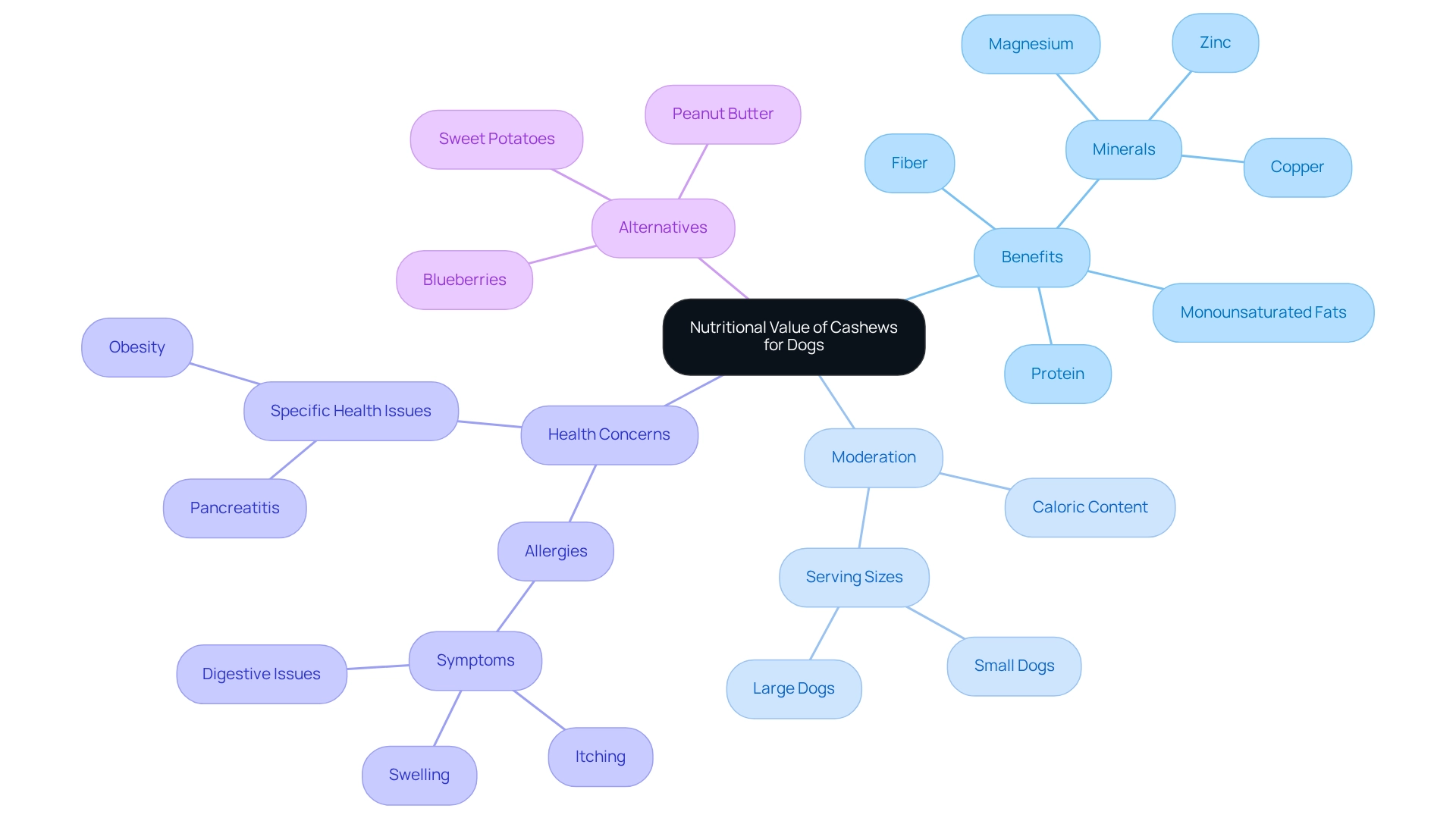
Identify the Risks of Feeding Cashews to Dogs
As a loving pet owner, you want the best for your furry family members, and while nuts can be a delightful snack, it’s crucial to consider if can dogs eat cashews before adding them to your pet’s diet. The high-fat content in these nuts may lead to obesity and pancreatitis, especially in breeds that are predisposed to these conditions. Research shows that high-fat meals can trigger gastrointestinal issues, such as diarrhea and vomiting, which are common concerns for many pet owners.
Furthermore, salted or flavored nuts can upset your dog’s stomach and lead to additional complications. Choking hazards are another important consideration, particularly for smaller dogs, as whole nuts can be difficult to chew. To help keep your pets safe, always opt for unsalted, plain nuts and ensure they are free from any additives. It’s also essential to check for mold on nuts, as this can pose significant health risks.
If your dog exhibits signs of distress after consuming nuts—like excessive drooling, lethargy, or unusual behavior—please consult your veterinarian promptly. Remember, it’s always wise to speak with your veterinarian to find out if can dogs eat cashews before introducing new foods, such as nuts, into your dog’s meals to ensure their safety. By following these guidelines, you can safely incorporate nuts into your dog’s diet while minimizing health risks, allowing you to nurture your pet in the best possible way.
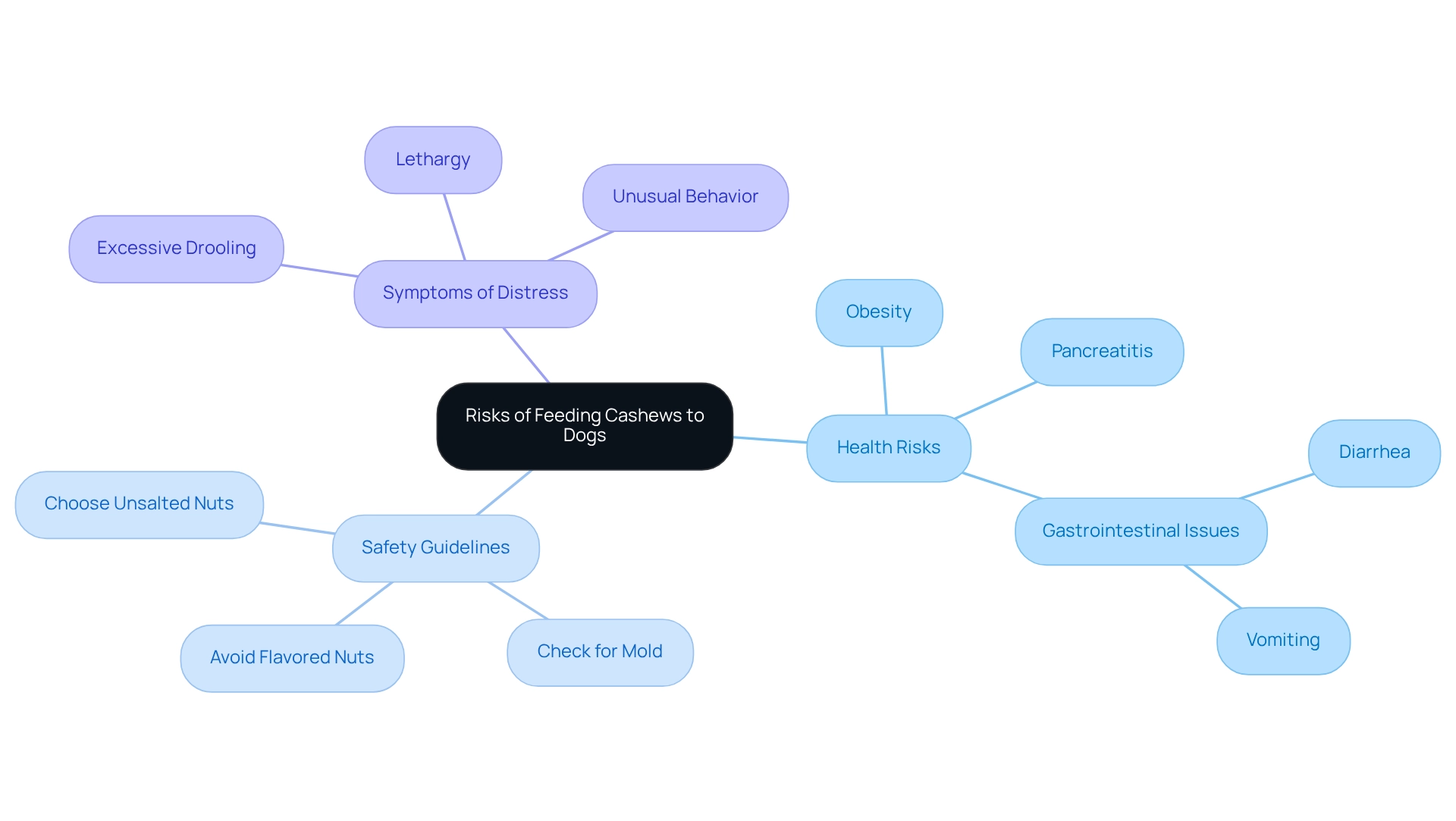
Learn How to Safely Introduce Cashews into Your Dog’s Diet
When done thoughtfully, incorporating nuts into your dog’s diet raises the question of can dogs eat cashews safely and enjoyably. Start with just a small amount—one or two for larger dogs and only one for smaller breeds. It’s essential to monitor your furry friend closely for any adverse reactions over the next 24 hours. Watch for signs like gastrointestinal upset or allergic reactions, such as swelling, hives, or increased scratching. While these nuts are not toxic, it’s important to be aware of potential risks, including high-fat content that could lead to pancreatitis and choking hazards, particularly when asking if can dogs eat cashews.
If your dog shows no adverse effects, you can gradually increase the quantity, but remember to keep the total amount of nuts limited to ensure they do not exceed 10% of your dog’s daily caloric intake. Always choose plain, unsalted nuts, and consider chopping them into smaller pieces to further reduce choking risks. As Anna Burke wisely notes, “However, considering the pros and cons involved, there really is no reason why you should feed nuts to your dog.”
For a safer and more appealing option, try serving nut butter on a spoon or freezing it into a KONG toy. This cautious approach aligns with expert recommendations and helps ensure a positive dietary change for your beloved pet. Your furry family member deserves the best, and with these thoughtful steps, you can create a nurturing environment for them.
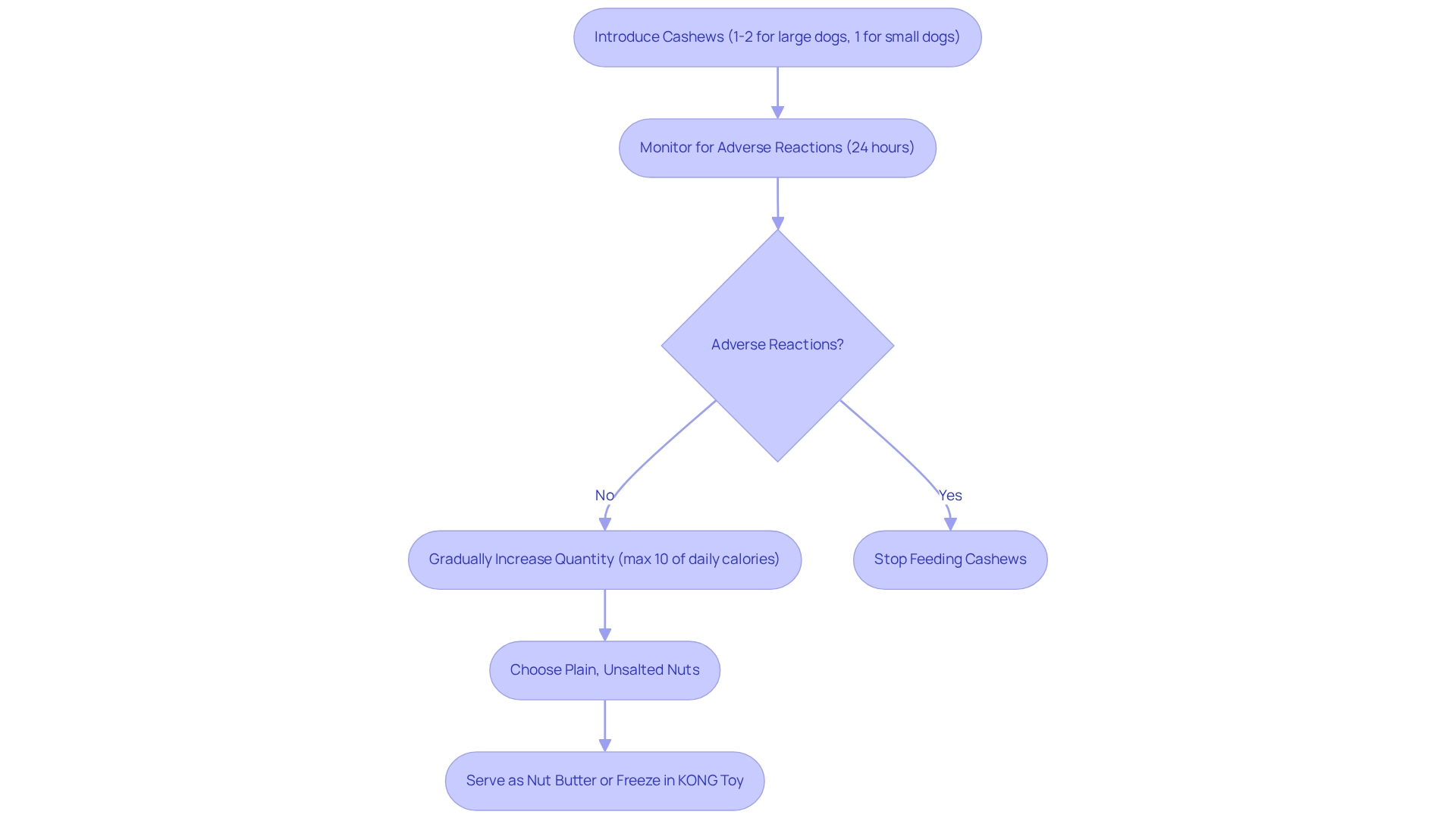
Review Best Practices for Feeding Cashews to Dogs
When considering the addition of cashews to your furry family member’s diet, it’s important to follow these best practices to ensure their safety and health:
- Moderation is Key: Limit nut treats to just a few pieces per week, tailored to your dog’s size and dietary requirements. Excessive consumption can lead to medical problems, including salt toxicity from salted varieties, which may cause symptoms such as vomiting, weakness, diarrhea, muscle tremors, and seizures.
- Choose the Right Type: Always select raw or roasted nuts that are unsalted and free from any seasonings. Flavored varieties can pose additional risks to your dog’s health.
- Monitor for Reactions: After introducing cashews, closely observe your dog for any signs of allergies or digestive disturbances, such as vomiting or diarrhea. This vigilance is crucial, as some dogs may react negatively to new foods.
- Consult Your Vet: For personalized nutritional guidance, particularly if your dog has existing medical issues or weight management needs, consult your veterinarian. They can provide guidance on the best treat options and weight loss plans, ensuring your dog’s overall well-being. As Anna Burke notes, “However, considering the pros and cons involved, there really is no reason why you should feed nuts to your dog,” highlighting the need for careful consideration.
By following these guidelines, you can determine if dogs can eat cashews safely while emphasizing their well-being and joy. Additionally, consider the insights from case studies on weight management dog food, which suggest that specialized diets can assist in managing a dog’s weight effectively, contributing to their overall health.
Conclusion
Cashews can be a nutritious treat for your furry family members, offering healthy fats, protein, and essential minerals that support their overall health. However, moderation is crucial. The high caloric and fat content can lead to serious health issues such as obesity and pancreatitis. As a caring pet owner, it’s important to be vigilant when introducing cashews into your dog’s diet. Start with small amounts and monitor for any adverse reactions, including allergies or gastrointestinal upset.
Understanding the risks associated with feeding cashews is equally important. Salted or flavored varieties can pose additional dangers, and choking hazards exist, particularly for smaller dogs. By choosing plain, unsalted cashews and consulting with a veterinarian, you can help ensure your furry friend enjoys this treat safely.
Implementing best practices is key to ensuring their well-being. Limit the frequency of cashew treats and closely observe any reactions to further safeguard your dog’s health. While cashews can be a delightful addition to a dog’s diet when introduced properly, they should never replace a balanced, species-appropriate diet. Ultimately, the well-being of your pets should always come first. By making informed choices about their treats, you can lead them to a happy, healthy life.
Frequently Asked Questions
Can dogs eat cashews?
Yes, dogs can eat cashews in moderation. They are rich in nutritious monounsaturated fats, protein, fiber, and essential minerals that can support health.
What are the nutritional benefits of cashews for dogs?
Cashews provide beneficial nutrients such as monounsaturated fats for cardiovascular health, protein, fiber, and essential minerals like magnesium, zinc, and copper, which are important for bone health and the immune system.
How should cashews be incorporated into a dog’s diet?
Cashews should be treated as an occasional treat due to their high caloric content. Small dogs may only need one or two nuts, while larger breeds can have a few more based on their caloric needs.
Are there any health concerns associated with feeding dogs cashews?
Yes, cashews are not recommended for dogs with certain health issues, such as pancreatitis or obesity, due to their high fat levels. Consulting with a veterinarian is advisable before introducing cashews to a dog’s diet.
Can dogs have sensitivities to cashews?
Some dogs may have sensitivities to nuts, which can lead to symptoms like itching, swelling, or digestive problems. It’s important to monitor for any adverse reactions when introducing cashews.
What are some alternative dog-friendly snacks?
Alternatives to cashews include blueberries, peanut butter, and sweet potatoes, which can provide a diverse and nutritious diet for dogs.





